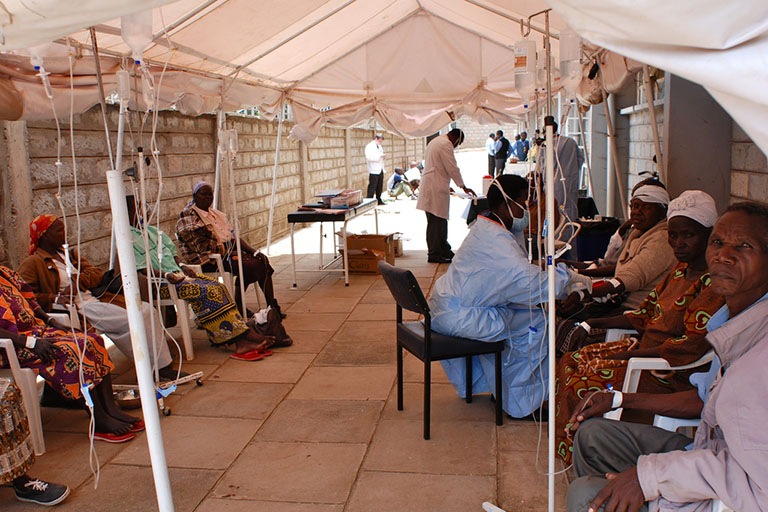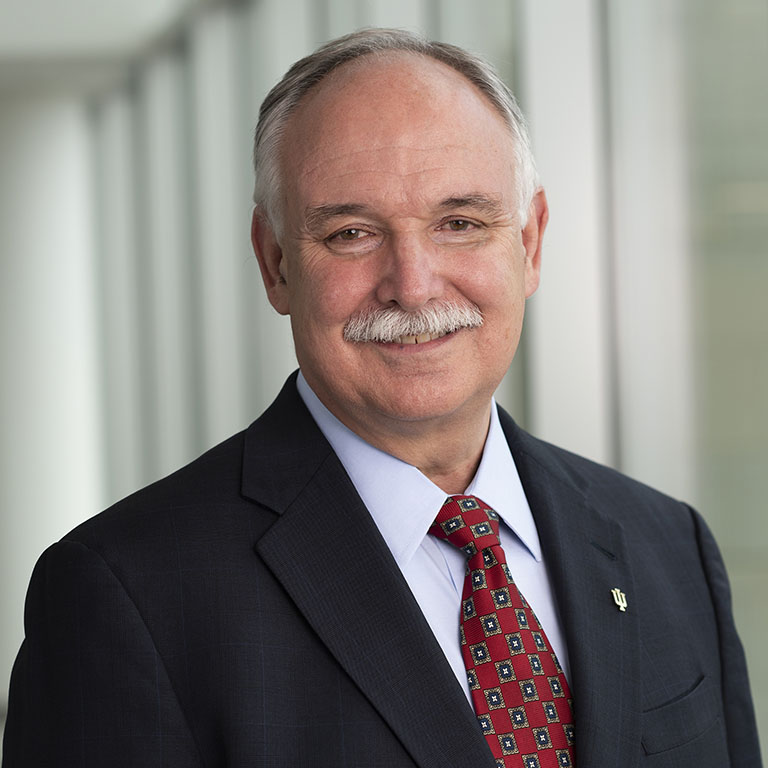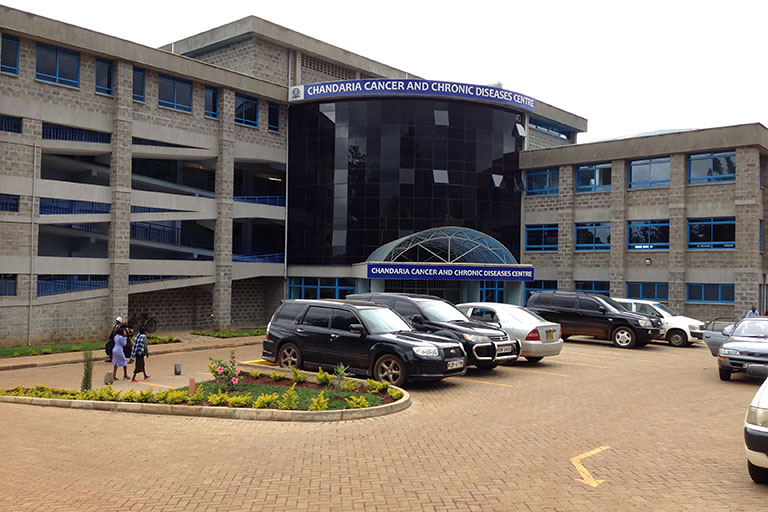It has been said that cancer does not discriminate. It cares little if the patient is a toddler or in their 90s. It doesn’t care if the patient is male, female or transgender. And cancer has no geographical boundaries. Yes, cancer is as complex as the various permutations of the 22,000+ coding genes in the body, but the disparities in outcomes we witness in cancer are more often related to socioeconomic or geopolitical factors. These are problems in our own backyard and around the world — this is basis of global oncology.
As a National Cancer Institute-designated Comprehensive Cancer Center, the IU Simon Comprehensive Cancer Center was built on the premise that we want to end the burden of cancer in Indiana and beyond. We have made strong progress in the outcomes of cancer in this country through research, education and clinical care, resulting in a decrease in the mortality of cancer. In limited-resource countries like Kenya, clinical care, research and education are starting from a different baseline than in the West, and they have different challenges which they are addressing.
Global Oncology: The Beginnings

Indiana University School of Medicine has been involved with Moi Teaching and Referral Hospital (MTRH) and Moi University School of Medicine in Eldoret, Kenya, for three decades. This partnership of North American universities led by IU is called the Academic Model Providing Access to Healthcare (or AMPATH). AMPATH’s mission is to Lead with Care.
In the early 2000s, a visit to MTRH by a cancer center oncologist revealed a desperate situation in addressing the emerging cancer problem. As illustrated in the photo above of a chemotherapy “infusion suite,” there was little physical infrastructure, few trained oncologists and limited to no access to chemotherapy or radiotherapy. More than 15 years ago, the cancer center chose to partner with physicians at MTRH to make a difference.

Humanitarian Award Winner Dr. Patrick J. Loehrer Sr.
During the 2023 American Society of Clinical Oncology (ASCO) Annual Meeting, Patrick Loehrer, MD, director of the Center for Global Oncology, earned the Humanitarian Award in recognition of his work personifying ASCO’s mission and values as well as providing service and leadership both at home and abroad.
Leading with Care
Populations in low to middle-income countries (LMICs) like Kenya will see a disproportionate rise in the incidence and mortality from cancer in the next decade. AMPATH-Oncology is well-positioned to face this crisis. To do this well, we need a dedicated and trained workforce, adequate physical infrastructure and broader access to essential medicines that specifically target cancers seen in Sub-Saharan Africa.

In the past two decades, we have steadily addressed these issues. We have evolved from treating patients under the cover of a tent to now caring for them in the $5.5 million Chandaria Cancer and Chronic Disease Center.
1,000+patients are seen each month
80+patients receive chemotherapy each week
50+patients are treated with radiation therapy each day
Workforce capacity, research pillar
Globally, cancer is rising rapidly. Much of the burden falls onto LMICs where more than 70 percent of cancer deaths occur. In Sub-Saharan Africa (SSA) alone, more than one million annual cancer deaths are expected to occur by the year 2040. These LMICs are ill-equipped to manage this crisis. For example, not long ago, less than a handful of trained oncologists existed in Kenya and none in the western half of the country. This, coupled with limited pathologic and radiographic services, scant supply of any chemotherapy (let alone drugs specific for cancers seen), absence of radiotherapy, oncology-trained surgeons, or palliative care made cancer care virtually non-existent.
Since 2004, AMPATH-Oncology has become a flagship of Global Oncology advancing the tripartite academic mission of education, research and clinical care. The complexity of cancer care not only demands a well-trained workforce, but one which is engaged in continuous professional development to keep up with the rapid changing nuances to biology and treatments.
AMPATH-Oncology has led the efforts at Moi University School of Medicine (MUSM) and Moi Teaching and Referral Hospital (MTRH) to provide an educational platform for the next generation of health care professionals trained for the increasing number of cancer patients.
We helped to establish the first Gynecologic-Oncology fellowship in the country, which now has 14 graduates – two of whom subsequently became department heads. We also helped to establish a pediatric oncology fellowship program at MTRH which has graduated its first two fellows, currently on staff. Additionally, recently a medical oncology fellowship has been approved by MUSOM. At MTRH, we have certificate training programs in palliative care and nursing oncology. Programs for radiation physics and surgical oncology are in planning stages.
To ensure continuous professional development, we have established a monthly virtual Global Oncology Grand Rounds, interactions with the community via Project ECHO, and we will be expanding our multidisciplinary tumor boards. Several faculty and trainees have presented research findings through publications and at national and international meetings (e.g., ASCO, AORTIC, KESHO). We have also had workshops for trainees on grant writing, manuscript preparation and mentoring.
Future Aims
Our future needs include developing a more disease-specific virtual tumor board that allows for real-time international feedback on complex cases and training for our AMPATH partners in Ghana, Nepal and Mexico. Finally, we’re concentrating on a push for extramural funding research mechanisms (i.e., Fogarty, Fullbright, YIAs and CDAs).
Whereas AMPATH and AMPATH-Oncology are guided by the principle of Leading with Care, research remains the glue that binds the relationship between the North American Consortium of Universities with MUSM and MTRH. Population, clinical, and translational research provides the contextually relevant evidence that reveals the sociologic and biologic underpinnings that inform evidence-based guidelines for Kenya and other LMICs.
Far too many men, women and children in Kenya present with advanced or Stage III/ IV cancers, where cures are rare and treatments are largely palliative. Addressing those factors in delays in diagnosis, access to proper treatment, completion of therapy, integration of palliative care are fertile grounds for investigation. These issues are the research priorities for AMPATH-Oncology.
We have been fortunate to receive grant funding from various foundations including Eli Lilly Foundation and Takeda to advance breast and cervical cancer screening. To date, more than 122,000 women have been prospectively screened with nurses and clinical officers trained not only for screening but also early treatment for women with cervical dysplasia detected by VIA (Visual Inspection with Acetic Acid). Through a U54 grant mechanism, we have determined the variations of the HPV virus over time in women differ in women with and without HIV.
Children with acute lymphoblastic leukemia and Burkitt lymphoma who present in the United States have a 90 percent cure rate. A decade ago, it was rare for a child with these malignancies in Kenya to be cured. Through efforts supported by NCI-supplement grants, we have worked with our Kenyan colleagues to dramatically decrease the early abandonment of treatment and to increase the complete remission rates and survival treated at MTRH. There is still substantial work to mirror the results found in the United States, but today more than 50 percent of children seen at MTRH have long-term survival.
Future Aims
One of our future goals is to expand our infrastructure to conduct “pragmatic” cancer clinical trials in children and adults through AMPATH and with other sub-Saharan partners. We will increase our efforts to seek extramural funding in implementation and translational research with an emphasis on contextually relevant trials in major cancers common in Kenya, such as breast, cervical, esophageal and prostate malignancies. Additionally, we will initiate research to utilize genomic and pharmacogenomic information to guide our clinical care.
Return on Investment and Global Impact
The Center for Global Oncology at the IU Simon Comprehensive Cancer Center has greatly benefitted from philanthropic support from numerous donors in the private and public sector. This support has resulted in a substantial impact in the care of patients in western Kenya from 150 cancer patients seen yearly in the early 2000s to more than 150 patients now seen daily at the Chandaria Cancer and Chronic Disease Centre. In this same period, the few drugs available to patients (often unaffordable and through local pharmacies) has grown so that virtually all of the 62 cancer agents listed on the WHO Essential Medicines list are available to our patients.
The success of AMPATH upon addressing the HIV/AIDS pandemic in Kenya has served as model for success in the oncology arena. Yet, there is much work to do. We have shown what collaboration can accomplish when focused on a common goal. We have learned what it is like to deal with chronic diseases such as cancer in limited resource settings. This informs those in higher income countries how health care delivery can be more cost effective and more efficiently delivered.
Building the workforce and physical infrastructure through AMPATH-Oncology has helped the often-ignored men, women and children with cancer living in the public sector of western Kenya. These efforts have led to the Ministry of Health to support cancer within the National Hospital Insurance Fund, but many still fall outside this safety net. Fiscal toxicity thus impacts families with cancer as it does for many in our country. The clinical, educational, research pillars of the cancer center and AMPATH-Oncology are intertwined. The success of one is the success of the other. In the end, the world is a bit better for our work.
Give online via credit card
To make a gift online visit here and select the link below and follow the prompts.
Give via check
Please make your check payable to “IU Foundation/Global Oncology Research Fund” and mail to:
IU Simon Comprehensive Cancer Center
c/o IU Foundation
PO Box 7072
Indianapolis, IN 46207
Other gifts
If you have any questions or would like to give via cash wire, stock transfer, or donor-advised fund, please contact Amber Senseny at 317-278-4510.




